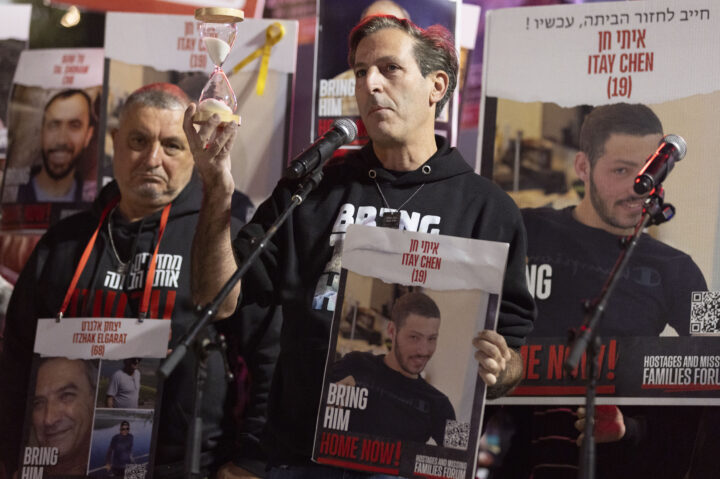Ruby Chen, father of U.S.-Israeli hostage, has ‘deep concerns’ son will be ‘left behind’
‘Metaphorically speaking, the bus that has the hostages that is leaving Gaza, my son should be on it as well as everybody else,’ Chen tells JI

Maja Hitij/Getty Images
Ruby Chen, father of 19-year-old hostage Itay Chen speaks at the press conference at hostage square on December 16, 2023 in Tel Aviv, Israel.
Ruby Chen, the father of a U.S.-Israeli hostage who was killed on Oct. 7, is fearful that the developing hostage-release and cease-fire deal will not bring back all of the 98 hostages still held in Gaza.
In an interview with Jewish Insider on Tuesday morning, following a visit he and his wife, Hagit, made to Doha, Qatar, over the weekend to meet with U.S. and Qatari officials, Chen, who did not learn until March 2024 that his son Itay had been killed on Oct. 7, said, “We see the list [of hostages reportedly set to be released]. We see what’s being materialized … We have deep concerns that our son will be left behind [for] an unknown period of time.”
Over a week ago, a Saudi newspaper published a list of 34 hostages it claimed would be released in the first phase of a cease-fire and hostage-release deal between Israel and Hamas — but that Hamas did not know, or would not say, who on the list is alive. Israeli officials told the press on Monday that a deal may be “days or hours away.”
The officials the Chens met with in Qatar included White House coordinator Brett McGurk, U.S. Ambassador to Qatar Timmy Davis and German Ambassador to Qatar Lothar Freischlader. Hagit and Itay Chen both hold German citizenship.
“The U.S. representatives that are there, which I met, I wanted to look them straight in the eye,” Chen said. He asked McGurk: “Why isn’t he [Itay] on that list?’ And I did not get a good answer,” Chen told JI.
Itay, who was 19, served in the 7th Armored Brigade’s 75th Battalion and was killed in battle with terrorists.
Of the statements that came out of Israel on Monday, Chen said, “there are too many ifs and today, there’s no guarantee that there will be a second phase.”
“Even though I believe and have faith in the Israeli negotiators … my problem is with the guidance that they’ve been given by the government,” Chen added.
The majority of the families, Chen said, “want something that’s very simple — a deal, it could be a phased deal, but it must include everybody.”
“Metaphorically speaking, the bus that has the hostages that is leaving Gaza, my son should be on it as well as everybody else. They can have a couple of stops, but he must be on the bus, meaning that the framework that is agreed upon can’t just have one phase and say, ‘Two weeks after we’ll start talking about the next phase.’ No. That is unacceptable.”
According to information given to the press on Monday, talks on the second stage of the deal would begin 16 days after the first stage began, which would see the release of 33 hostages.
“And I’d like to remind you that [Israeli Prime Minister] Bibi Netanyahu had a brother called Yoni Netanyahu, and when he was called on to go out and rescue hostages in Entebbe [in 1976], he did not say to his commanders, ‘You know what? I’ll go out and rescue 20, the others, I’ll come back next week, we’ll talk about it in two weeks from now.’ That’s not what happened. So the prime minister should remember how his brother … acted when it came to the hostages.”
Ruby and Hagit Chen are set to attend President-elect Donald Trump’s inauguration ceremony next week, invited along with other hostage families. Chen expressed hope that Trump will be able to say in his speech, “U.S. hostages, the Chen family, I did it — I brought everybody back.”





































